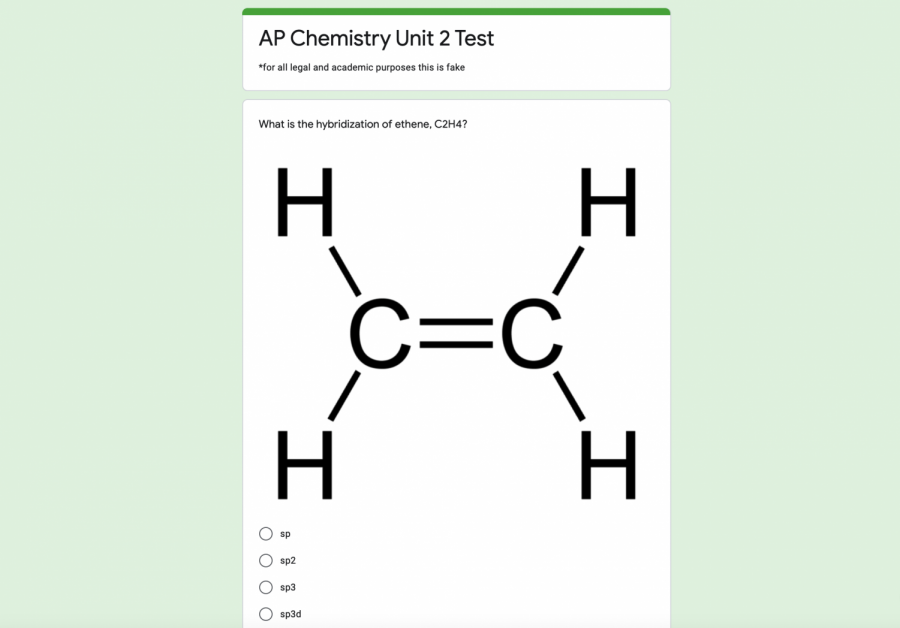Yes, BLS Should Have Virtual Tests
Online tests are necessary for gauging a student’s understanding of the lesson. Photo by: Hannah Stoll (V)
Over the past year, the format of learning has changed drastically as students across the globe have shifted to online schooling in light of the coronavirus pandemic. Tests, nevertheless, have endured in this new format — and for good reason, too.
“Tests are necessary for virtual learning because without them students wouldn’t have enough motivation to study. So much of our grade this year is based off of homework and participation which do not require as much due diligence as an actual test,” says Roan Wilcox (V).
Because each class is held only three times a week on the virtual schedule, as opposed to every day during a typical school year, teachers cover less content in class. This means students need to spend more time outside of class studying the material to meet learning benchmarks and thus tests create the necessary motivation to meet them.
This is especially true in classes such as Latin or math, where much of the material taught in class only builds on itself. Having concepts down will make it easier to do well in the class down the road.
Latin teacher Mr. Salvatore Bartoloma says, “I think number one [a test] is a measure of accountability for kids to stay current on their material. I think sometimes it’s easy for kids to put off learning a little bit until there’s the quiz or the tests so they create these little “benchmark” […] moments to make sure that you know what’s going on.”
In addition, tests help students identify the information that they have internalized. In many fields, especially those involving science, technology, engineering and math, there has been an increased focus on the application of concepts as opposed to rote memorization. Tests can be an effective indicator of understanding because they can differentiate between someone who has memorized a concept and someone who can actually use it.
Tests cover the key concepts and details from the class, meaning that a good grade indicates that student understands the material and pays attention in class.
Tests are just as helpful to the teachers. They are adjusting to completely new teaching formats and gauging the success of these new methods can be difficult.
“Sometimes we learn as much from the wrong answers as we do from students having the right answers. So if you see a consistent trend in students sort of making the same mistake […] it tells you as the teacher that’s something that you need to go back in and review,” says Mr. Bartoloma.
Despite the ease of looking up answers or referring to notes, it is often just as easy for teachers to tell if someone has cheated, either through unusual answer patterns, plagiarized responses or other similar giveaways. Tests that focus on applying concepts are usually more complicated and thus harder to look up. Taking a test might not be every student’s favorite task, but in the end, it is still necessary for virtual learning to be effective.
No, BLS Should Not Have Virtual Tests

Online testing is time-consuming, stressful and encourages intolerable behavior, such as cheating. With the first quarter of the school year coming to a close, every student has likely sat through a silent Zoom call taking a test via Google Forms — once used mostly for club sign-ups and project surveys, but now used for taking tests with impacts on a students’ grades. Online testing is the worst possible use of everyone’s time.
Virtual school cuts our class time in half. Excluding the time it takes to sort out technology issues on both the teacher’s and students’ end, we only have 135 minutes per class every week. Taking 35 or 50 minutes for a test, up to a third of weekly instruction time, is an inefficient use of the precious time that teachers could have used for instruction.
Besides, teachers already have more than enough on their plates as it is. With the switch to online learning, they have to get used to new technology and help their students with tech issues as well. They have to waste more time by creating several test versions to prevent cheating and it takes even more to grade all of them. Even with all of this preparation, teachers can, in reality, do little to protect academic integrity given how easy it is to cheat.
Ms. Sophia Campot, an English 12 teacher, says, “There is a place for timed writing and for ‘traditional’ test formats. […] In the virtual setting, it is almost impossible […] to determine how to administer such an exam and ensure that the students’ answers are authentic. Cheating is incredibly easy in an online format, and I would rather that you articulate your ideas through an oral presentation or writing assignment than by Googling an answer to a question and forgetting it immediately after.”
It is an open secret that many students cheat, and online, there is simply no way to catch them. In the information age, almost everything can be found on the internet. Evidence suggests that cheating occurred during the nation-wide AP exams last May, for instance. On Google Trends, there was a skyrocket in AP United States History related words such as ‘Manifest Destiny’, ‘Who won the American Revolution’ and ‘was slavery bad.” Certainly, this was not a coincidence.
If an international corporation cannot stop students, then a local school will not have any more luck.
The crux of the problem also lies in the unnecessary stress that online testing places on students. Students who do not study will not develop good habits to carry to college, and students who do study have to deal with the inflated curve. These students will have to struggle with attempting to study more while fighting the ethical battle in their head — all while stuck in the middle of a disastrous pandemic.
Furthermore, technical difficulties only further complicate the affair. Strained internet connections, computers randomly shutting down and Zoom meetings crashing are all common occurrences in classes.
Rather than continue to use this faulty and burdensome system, teachers should switch to in-class discussions or asynchronous work, like projects and other forms of graded assessments. Group work and projects without direct answers online will force students to conduct research, put time and effort into their work and will give teachers a better idea of students’ qualitative understanding of the coursework.
Pivoting towards alternatives will benefit students in terms of learning and mental health which will also allow teachers to give fair grades while better informing students about their quality of instruction. Not using online testing is a win-win situation for everyone.


